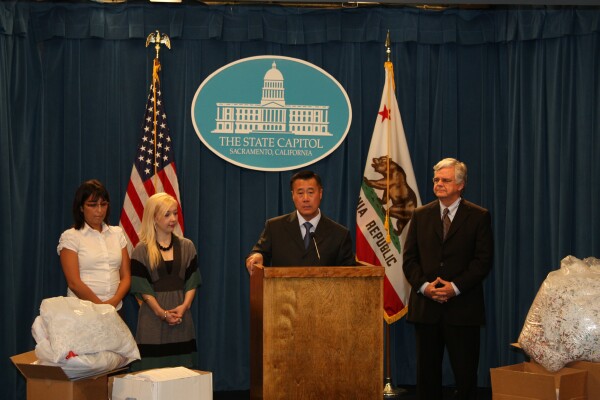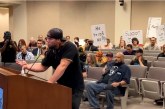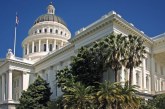 In recent years the Brown Act, which protects the fundament right for the public to be noticed of meetings by public officials and governmental bodies, has been suspended or threatened during the state’s current budget crisis.
In recent years the Brown Act, which protects the fundament right for the public to be noticed of meetings by public officials and governmental bodies, has been suspended or threatened during the state’s current budget crisis.
Under state law, local governments are reimbursed the cost of fulfilling statutory requirements enacted by the Legislature – so when the state’s budget fails to allow that reimbursement, local governments have argued that they are no longer required to fully notice meetings.
Senator Leland Yee, a strong advocate for government transparency, introduced a constitutional amendment to ensure public entities follow requirements to post agendas and to disclose any actions taken.
Senator Yee introduced Senate Constitutional Amendment (SCA) 7, after years in which fundamentally important provisions of the Ralph M. Brown Act – the state’s main open government law – have been suspended or threatened during state fiscal crisis.
“Californians have a fundamental right to know what their government is doing,” said Senator Yee. “One only needs to look at corruption within the City of Bell to realize that the Brown Act should never be compromised. Our open meeting laws are too important to be made optional every time the state runs short of money. SCA 7 will ensure government agencies provide the public the information they deserve.”
“SCA 7 will once and for all require local public bodies – city councils, county boards of supervisors, school boards and special districts – to give the public ample notice of meetings and actions,” said Tom Newton, General Counsel to the California Newspaper Publishers Association. “An open door means nothing if folks don’t know the location, time and place of the meeting and the issues to be discussed or decided.”
“Senator Yee’s proposed state constitutional amendment would provide an important safeguard for people wanting to know – as is their right – about the decisions of their local lawmakers and the bases for those decisions,” said Richard Knee, Chair of the San Francisco Sunshine Ordinance Task Force. “The Brown Act and the Public Records Act are the twin pillars of sunshine – i.e. government transparency and accountability – in California. And sunshine adherence is part of the job of every government official and employee in California.”
“It is extremely important that the Brown Act remain the law of the state – otherwise our elected officials will be accountable to no one,” said Dean Metzger, Chair of the Berkeley Citizen’s Sunshine Committee.
According to a release from the Senator, SCA 7 will require approval by two-thirds of the Legislature before qualifying for a statewide ballot in November or in a special election that may be called in June.
In 2004, nearly 83 percent of voters approved Proposition 59 – the Constitutional Sunshine Amendment – which provided the public greater access to government documents. It is expected that SCA 7 would face a similar overwhelming approval by the voters.
The Vanguard remains a very strong advocate of open public meetings and transparency. As we saw with our water process, truncating public input leads to mistrust in the decisions made by government – even in cases when our local officials have acted responsibly.
It is absolutely true that local government is hurting for funding. However, that should not alleviate the need to perform relatively low-cost methods to inform the public about what is going on.
We have continued to call for the City of Davis, which has a good record in responding to public records requests, to revamp their system of notification. The city does not take advantage of new technology and instead relies on outreach methods from twenty to thirty years ago.
Moreover, we remain concerned by the lack of clear policy in handling the recording of council meetings and the lack of retention of these vital public records.
—David M. Greenwald reporting






I’m certainly in favor of SCA 7. To me it is a no brainer.
dmg: “We have continued to call for the City of Davis, which has a good record in responding to public records requests, to revamp their system of notification. The city does not take advantage of new technology and instead relies on outreach methods from twenty to thirty years ago.”
Not sure what you mean here…
dmg: “Moreover, we remain concerned by the lack of clear policy in handling the recording of council meetings and the lack of retention of these vital public records.”
It would be good if recordings of council meetings could be retained…
It would be good if recordings of council meetings could be retained…
There’s no reason any private citizen couldn’t save these. There are various “stream ripping” softwares, including shareware, that will download streaming video to your computer.
The cost of noticing/archiving meetings should be falling given the use of the internet and electronic media.
However there are also unintended consequences to all this:
1. Some have interpreted the Public Records Act as requiring that UC and CSU faculty must provide the public access to all their work, their calendars, their computers etc. So far only State university administrators are subject to this in practice but its a grey area.
2. The PRA allows for some reimbursement of copying costs but from what I have seen the costs of staff time to comply with many requests is born by the local government/agency. I think any citizen should have access to public info but heavy users (e.g., some law firms or public interest groups) should probably have to bear the true cost after a certain number of requests.
3. It is likely that auxiliaries for public institutions such as university foundations will also be subject to these requests even though they are technically 503(c) organizations. In practice (and I know this first hand) this can put such organizations at a disadvantage compered tp private universities.
So there is a balance here folks.
Don Shor: “There’s no reason any private citizen couldn’t save these. There are various “stream ripping” softwares, including shareware, that will download streaming video to your computer.”
If citizens can do it easily, then so can the City. Furthermore, the city should keep accurate undoctored footage, readily accessible for those making a PRA request. I discovered how important keeping old records are, when there was a second attempt to eliminate the Senior Citizens Commission 4 years after the first attempt. Gov’t keeps records in the first place for a reason – to permanently memorialize what actually happened – information that very well may be needed for referral to at a future/later time (sometimes years) by the public. Context/history is often important.
Dr. Wu: “So there is a balance here folks.”
What subject matter is subject to a PRA request, versus what agencies/entities are subject to a PRA request are two different questions. When minutes/film footage to public meetings are taken, I see no reason why that cannot be archived and made accessible at all times. Reasonable copying costs should be chargeable to those who ask for copies of large amounts of information. But intruding into personal calendars, computers and the like seems over the top – has this type of intrusion been granted w/o a subpoena in a CA PRA that you know of? I am aware there was an attempt to delve into the business of CSU foundations (501(c)3s), but it was singularly unsuccessful if I remember correctly…